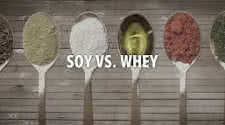Compare Whey Protein to Soy Protein for Weight Loss | Weight Gain

Advanced Nutrition is Essential for Advanced Results
Traditionally, body builders have not used soy as one of their primary protein sources because most soy protein products, particularly the cheaper ones, are difficult to digest and they have a low biological value (BV) of 70 compared to 80 or higher for most animal-source
proteins, Milk and tissue proteins are easier to digest and are well utilized by the body. Advances in technology have made soy proteins more expensive than they once were; however, the resulting products better health and body building benefits. New soy products are easier to
digest. Several contain a mix of soy and whey, increasing not only their appeal to bodybuilders hut also their effectiveness.
Whey increases the BV of soy protein by balancing soy's essential amino acid profile. The BV of a dietary protein increases when its amino acid profile more closely resembles that of whey protein. Furthermore, adding whey to newer versions of soy protein improves digestibility
via the biologically active fractions in whey. Proteins such as lactoferrin and immurioglobulins help protect the digestive tract from pathogens as well as from the effects of severe stress. Overall, you may notice that it's easier to digest these new soy products. Mixed
whey and soy offers more glutamine than whey, alone Soy contains approximately 10%-11% of glutamine; whey typically contains SIX percent.
Almost everyone understands the benefits of glutamine for a hard training athlete: It assists recovery and enhances immune response. So it would benefit bodybuilders to I consume more of it, especially "bonded-glutamine," which is stable in stomach acid. Consumers who are
accustomed to milk proteins have not been particularly fond of the taste of most soy products.
New flavor and masking systems have greatly improved the taste of soy/whey combinations, but these improvements are also expensive, further jacking up the price. In its favor, soy provides many health benefits possibly reducing the risk of heart disease and some kinds of cancer,
including breast cancer in women. Soy components may protect against cancer by inhibiting a tumor's ability to create blood vessels to feed itself. Soy also contains antioxidants such as the isoflavones genistein and daidezein, as well as phytic acid. Antioxidants can protect
cells against free-radical damage that may lead to cancer.
Soy's beneficial effect on heart disease seems to he primarily related to cholesterol reduction and improvement in blood lipid profiles. in a recent study presented at the American Heart Association's conference on epidemiology, researchers put groups of people on two different
diets that were equal in calories and saturated fat. The first diet was based on standard American fare; the other was plant-based, including many soy foods and whole grains. The subjects who ate a plant-based diet had improvements in their blood lipid profiles, even though
they were eating the same amount of saturated fat as the other group (who ate mostly refined foods, meat, etc.). There's a need for further research, especially in light of a recent report that showed negative effects on the mental abilities of people who ate a lot of soy in
the form of tofu over a period of decades. Some researchers also caution against overdoing soy by popping isoflavone pills as if they were candy.
The health benefits, though, of eating a varied diet that includes more plant-based foods can't be denied. Bodybuilding nutrition is often about consuming enough protein and other nutrients to make muscle growth possible and have enough energy to train. Eating for health can
take more attention and time, hut it can be compatible with bodybuilding nutrition. By eating a mix of plant and animal-based protein sources, you can fulfil! your bodybuilding nutrition requirements and also give your body a healthy boost. Combining whey and soy proteins
gives you the advantages of both.